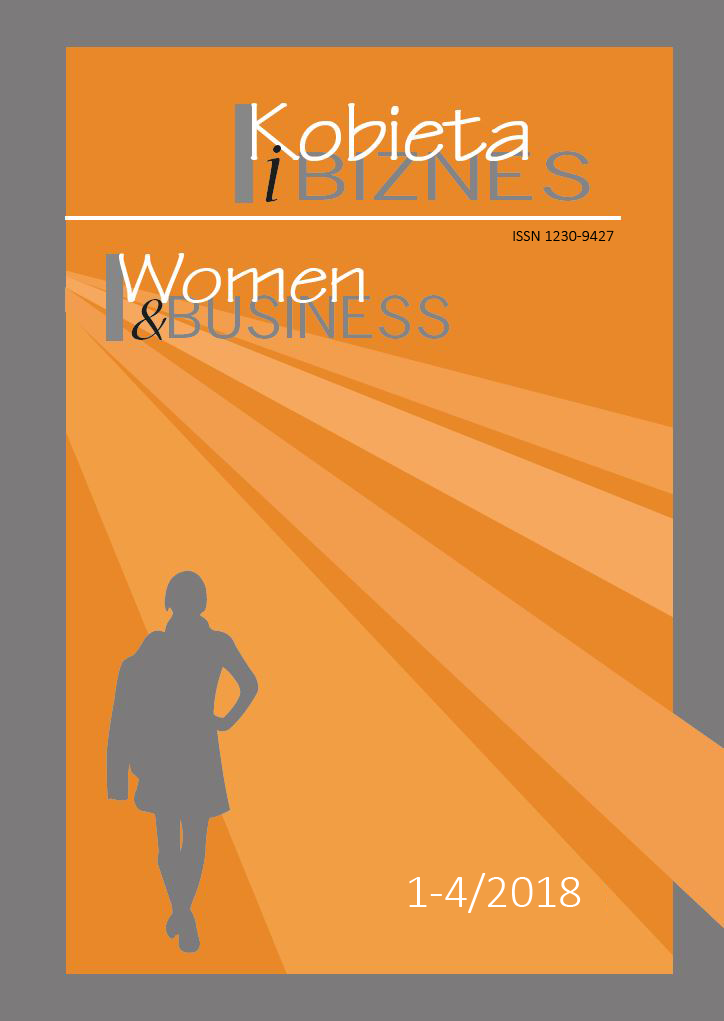Why career sponsorship matters for advancing women
Main Article Content
Abstract
Sponsorship is the solution to solving this persistent gender problem of too few senior women leaders - a problem that has been "plaguing" both the private and public sectors in Poland, Singapore and the vast majority of countries across the world for decades. My research, which comprised of an autoethnography, a case study research and an online study showed that sponsorship is effective in driving an upward career trajectory by at least one to two levels on the organisational hierarchy. As career sponsorship is still a relatively new phenomenon, the goal of this paper is to define and give an overview of sponsorship so that more people, especially women, can benefit from it.(fragment of text)
Article Details
Authors retain copyright and grant the journal right of first publication with the work simultaneously licensed under a Creative Commons Attribution License that allows others to share the work with an acknowledgement of the work's authorship and initial publication in this journal. All authors agree for publishing their email adresses, affiliations and short bio statements with their articles during the submission process.
Author agrees to share his work under CC-BY-NC license.
References
2. DeFillippi R.J., Arthur M.B. [1994], The boundaryless career: A competency-based perspective, "Journal of Organisational Behaviour", 15 (4), 307-324.
3. Denzin N.K. [2006], Analytic autoethnography, or déjà vu all over again, "Journal of Contemporary Ethnography", 35 (4), 419-428.
4. Ehrlinger J., Dunning D. [2003], How chronic self-views influence (and potentially mislead) estimates of performance, "Journal of Personality and Social Psychology", 84 (1), 5-17.
5. Eisenhardt K.M. [1989], Building theories from case study research, "Academy of Management Review", 14 (4), 532-550.
6. Friday E., Friday S.S., Green A.L. [2004], A reconceptualisation of mentoring and sponsoring, "Management Decision", 42 (5), 628-644.
7. Hewlett S.A. [2013], Forget a mentor. Find a sponsor: The new way to fast-track your career, Harvard Business Review Press.
8. Ibarra H., Carter N.M., Silva C. [2010], Why men still get more promotions than women, "Harvard Business Review", 88 (9), 80-85.
9. Ibarra H., Obodaru O. [2009], Women and the vision thing, "Harvard Business Review".
10. Kram K.E. [1983], Phases of the mentor relationship, "Academy of Management Journal", 26 (4), 608-625.
11. Kram K.E., Isabella L.A. [1985], Mentoring alternatives: The role of peer relationships in career development, "Academy of Management Journal", 28 (1), 110-132.
12. Marcinkus Murphy W. [2012], Reverse mentoring at work: Fostering cross generational learning and developing millennial leaders, "Human Resource Management", July-August, 51 (4), 549-573.
13. Noe R.A. [1988], An investigation of the determinants of successful assigned mentoring relationships, "Personnel Psychology", 41, 457-478.
14. Pfeffer J. [1998], The human equation: Building profits by putting people first, Harvard Business Press.
15. Reskin B.F. [1979], Academic sponsorship and scientists' careers, "Sociology of Education", 52, 129-146.
16. Scandura T.A. [1992], Mentorship and career mobility: An empirical investigation, "Journal of Organisational Behaviour", 13 (2), 169-174.
17. Tuminez A.S., Duell K., Majid H.A. [2012], Rising to the top?: A report on women's leadership in Asia, Lee Kuan Yew School of Public Policy, National University of Singapore, http://sites.asiasociety.org/womenleaders/wp-content/uploads/2012/04/Rising-to-the-Top.pdf
18. Wall S. [2008], Easier said than done: Writing an autoethnography, "International Journal of Qualitative Methods", 7 (1), 38-53.
19. Wayne S.J., Liden R.C., Kraimer M.L., Graf I.K. [1999], The role of human capital, motivation and supervisor sponsorship in predicting career success, "Journal of Organisational Behaviour", 20 (5), 577-595.
20. Yin R.K. [1981], The case study crisis: Some answers, "Administrative Science Quarterly", 26, 58-65.
21. Yin R.K. [2014], Case study research: Design and methods, Sage Publication, London

